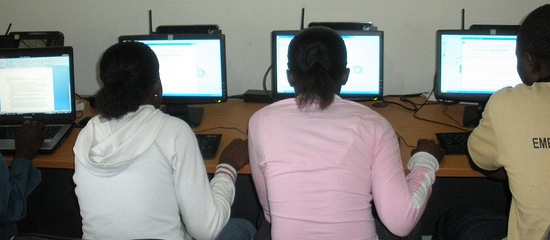How Can Digital Learning Resources Expand Education in Africa?
As African governments start incorporating more information and communication technologies (ICT) into their educational systems, they will need to expand their digital learning resources to take full advantage of their ICT investments. Yet, there are at least three questions that need to be asked with regards to digital learning resources:
- What are appropriate models to procuring or developing suitable digital content?
- Can openly licensed content play a meaningful role in supporting education in Africa?
- What are the major challenges to finding, adapting, and using digital content effectively?
Over the next several posts, the Educational Technology Debate will examine these questions and more. Our goal is to provide input into a forthcoming study for African governments and development practitioners on the use of ICT in learning in the developing world.
The World Bank Group and the African Development Bank, with the support of the African Union, commission the study to explore how ICT has the potential to change fundamental business models in key sectors for Africa.


Sugar Labs, which provides the Sugar software for One Laptop Per Child XOs, has started a project called Replacing Textbooks to create OER materials for all subjects at all levels for all countries in all languages needed. This includes all levels of teacher training as well.
http://wiki.sugarlabs.org/go/Replacing_Textbooks
Blog: http://replacingtextbooks.wordpress.com
There are many other projects working on various part of the overall requirement.
What are appropriate models to procuring or developing suitable digital content?
Among others,
* Subject matter experts can create OER materials in their areas of expertise and put them under Creative Commons licenses on their own initiative, just as a few do now. See, for example, the catalog at
http://www.librarianchick.com/
* NGOs and governments can contract with groups of subject matter experts, instructional designers, and others to produce materials to meet their curriculum standards.
* Governments can put out a call for existing OER materials, as the California Free Digital Textbook Initiative has done.
http://www.clrn.org/fdti/
* Research groups can explore how children can learn topics more deeply or at an earlier stage of development with computer assistance, as some have done since the 1960s. Now we can afford to deploy what they have found to work.
* Courses can be designed around specific software packages for math, science, art, music, writing, programming, and other subjects. Among others,
http://activities.sugarlabs.org//en-US/sugar/
Can openly licensed content play a meaningful role in supporting education in Africa?
It already does, and much, much more is coming. See, as one example in South Africa,
http://www.shuttleworthfoundation.org/projects/fr…
What are the major challenges to finding, adapting, and using digital content effectively?
Convincing governments that computers with Free Software and OER cost less than printed textbooks, so they should fully fund development of educational software and OER for all subjects at all levels of child development for all countries in all languages needed, and for teacher training. Since the investment required is negative, the Return on Investment is infinite.
http://www.wsis-community.org/mod/groups/topicpos…
Community discussion > OER Economics for a billion children